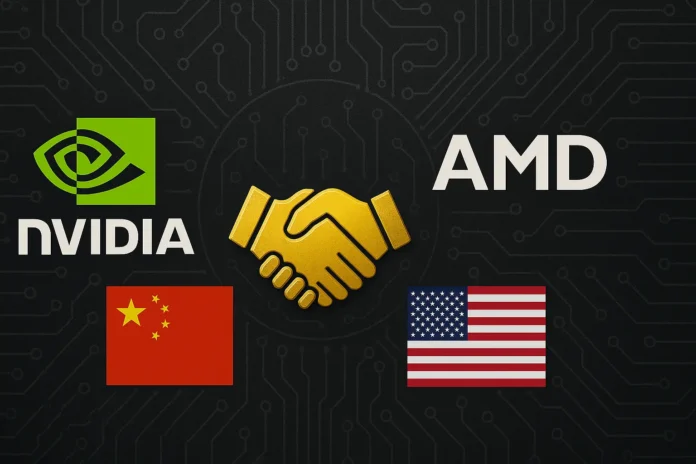Nvidia and AMD have struck an unusual agreement with the US government, pledging to hand over 15% of revenues from specific chip sales in China as part of a deal to obtain export licences.
According to people familiar with the arrangement, including a US official, the agreement covers Nvidia’s H20 chip and AMD’s MI308 chip. The export licences for these products were granted last week, with Nvidia’s clearance following a meeting between its chief executive, Jensen Huang, and President Donald Trump.
The Financial Times reported that the US Commerce Department began issuing H20 licences last Friday, just two days after Huang’s meeting with Trump. Licences for AMD’s chip sales to China were also approved.
First-of-its-Kind Arrangement
Export control experts say this form of “quid pro quo” deal is unprecedented, with no previous examples of a US company agreeing to pay a share of revenues in return for export licences. While the Trump administration has yet to determine how the funds will be used, the move aligns with a pattern where the president encourages companies to take steps—such as investing domestically—to avoid tariffs and boost US revenues.
Nvidia did not deny the revenue-sharing terms, saying: “We follow rules the US government sets for our participation in worldwide markets.” AMD declined to comment.
Bernstein analysts estimate Nvidia could sell around 1.5 million H20 chips to China in 2025, generating roughly $23 billion in revenue before the new export controls were imposed earlier this year.
Controversy Over the H20 Chip
The H20 chip was designed for China after President Joe Biden placed strict export controls on advanced AI chips. In April, the Trump administration said it would ban the chip’s export to China, but the decision was reversed in June after Huang met with Trump.
Following the reversal, Nvidia raised concerns over delays in the Bureau of Industry and Security (BIS) issuing the necessary licences. The matter was reportedly discussed directly between Huang and Trump on Wednesday, with licences beginning to be granted two days later.
The decision has sparked criticism from US security experts, who argue that the H20 could boost China’s military and AI capabilities. Matt Pottinger, former deputy national security adviser, joined 19 others in a letter urging the Commerce Department not to grant licences, calling the chip a “potent accelerator” for China’s AI development. Nvidia has dismissed these claims as “misguided”.
A Strategic Backdrop
This policy shift comes as the US and China engage in trade talks ahead of a possible summit between Trump and Chinese President Xi Jinping. Reports suggest the Commerce Department has been told to halt new export controls to avoid souring relations with Beijing.
China is also seeking eased restrictions on high-bandwidth memory (HBM) chips—vital components for manufacturing advanced AI chips.
Balancing Commerce and Security
This agreement between Nvidia, AMD, and the US government is significant not just for its financial terms but for the precedent it sets. It represents a middle ground between enforcing export controls and maintaining market access. On one hand, it ensures the US benefits financially from sales to China. On the other, it risks criticism from national security advocates concerned about potential military applications.
Whether this revenue-sharing approach becomes a model for future technology trade with China remains to be seen, but its uniqueness makes it a turning point in how Washington manages both commerce and security in the AI era.


